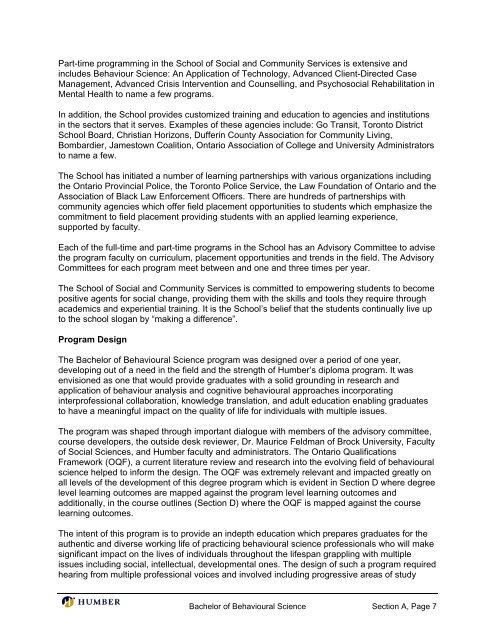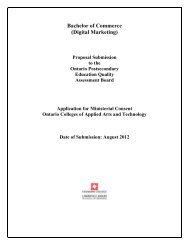Bachelor of Behavioural Science - Postsecondary Education Quality ...
Bachelor of Behavioural Science - Postsecondary Education Quality ...
Bachelor of Behavioural Science - Postsecondary Education Quality ...
You also want an ePaper? Increase the reach of your titles
YUMPU automatically turns print PDFs into web optimized ePapers that Google loves.
Part-time programming in the School <strong>of</strong> Social and Community Services is extensive and<br />
includes Behaviour <strong>Science</strong>: An Application <strong>of</strong> Technology, Advanced Client-Directed Case<br />
Management, Advanced Crisis Intervention and Counselling, and Psychosocial Rehabilitation in<br />
Mental Health to name a few programs.<br />
In addition, the School provides customized training and education to agencies and institutions<br />
in the sectors that it serves. Examples <strong>of</strong> these agencies include: Go Transit, Toronto District<br />
School Board, Christian Horizons, Dufferin County Association for Community Living,<br />
Bombardier, Jamestown Coalition, Ontario Association <strong>of</strong> College and University Administrators<br />
to name a few.<br />
The School has initiated a number <strong>of</strong> learning partnerships with various organizations including<br />
the Ontario Provincial Police, the Toronto Police Service, the Law Foundation <strong>of</strong> Ontario and the<br />
Association <strong>of</strong> Black Law Enforcement Officers. There are hundreds <strong>of</strong> partnerships with<br />
community agencies which <strong>of</strong>fer field placement opportunities to students which emphasize the<br />
commitment to field placement providing students with an applied learning experience,<br />
supported by faculty.<br />
Each <strong>of</strong> the full-time and part-time programs in the School has an Advisory Committee to advise<br />
the program faculty on curriculum, placement opportunities and trends in the field. The Advisory<br />
Committees for each program meet between and one and three times per year.<br />
The School <strong>of</strong> Social and Community Services is committed to empowering students to become<br />
positive agents for social change, providing them with the skills and tools they require through<br />
academics and experiential training. It is the School’s belief that the students continually live up<br />
to the school slogan by “making a difference”.<br />
Program Design<br />
The <strong>Bachelor</strong> <strong>of</strong> <strong>Behavioural</strong> <strong>Science</strong> program was designed over a period <strong>of</strong> one year,<br />
developing out <strong>of</strong> a need in the field and the strength <strong>of</strong> Humber’s diploma program. It was<br />
envisioned as one that would provide graduates with a solid grounding in research and<br />
application <strong>of</strong> behaviour analysis and cognitive behavioural approaches incorporating<br />
interpr<strong>of</strong>essional collaboration, knowledge translation, and adult education enabling graduates<br />
to have a meaningful impact on the quality <strong>of</strong> life for individuals with multiple issues.<br />
The program was shaped through important dialogue with members <strong>of</strong> the advisory committee,<br />
course developers, the outside desk reviewer, Dr. Maurice Feldman <strong>of</strong> Brock University, Faculty<br />
<strong>of</strong> Social <strong>Science</strong>s, and Humber faculty and administrators. The Ontario Qualifications<br />
Framework (OQF), a current literature review and research into the evolving field <strong>of</strong> behavioural<br />
science helped to inform the design. The OQF was extremely relevant and impacted greatly on<br />
all levels <strong>of</strong> the development <strong>of</strong> this degree program which is evident in Section D where degree<br />
level learning outcomes are mapped against the program level learning outcomes and<br />
additionally, in the course outlines (Section D) where the OQF is mapped against the course<br />
learning outcomes.<br />
The intent <strong>of</strong> this program is to provide an indepth education which prepares graduates for the<br />
authentic and diverse working life <strong>of</strong> practicing behavioural science pr<strong>of</strong>essionals who will make<br />
significant impact on the lives <strong>of</strong> individuals throughout the lifespan grappling with multiple<br />
issues including social, intellectual, developmental ones. The design <strong>of</strong> such a program required<br />
hearing from multiple pr<strong>of</strong>essional voices and involved including progressive areas <strong>of</strong> study<br />
<strong>Bachelor</strong> <strong>of</strong> <strong>Behavioural</strong> <strong>Science</strong> Section A, Page 7
















